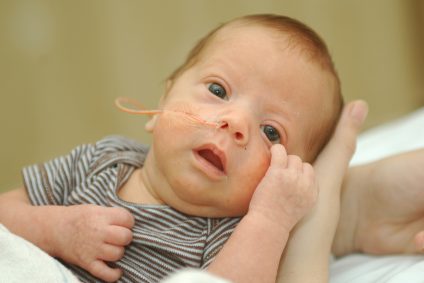
Another day, another crappy breastfeeding study.
A new study was recently released by the Journal of Pediatrics purporting to show the benefit of breastmilk of neurocognitive development in premature infants. Unfortunately the study, Breast Milk Feeding, Brain Development, and Neurocognitive Outcomes: A 7-Year Longitudinal Study in Infants Born at Less Than 30 Weeks’ Gestation, is fundamentally disingenuous and deeply misleading.
[pullquote align=”right” cite=”” link=”” color=”” class=”” size=””]There is no remotely plausible reason to use number of days on which infants received >50% breast milk as a measure of breastmilk intake.[/pullquote]
Here’s what the authors claimed they found:
We studied 180 infants born at < 30 weeks gestation or < 1250 grams birth weight enrolled in the Victorian Infant Brain Studies cohort from 2001-2003…
Predominant breast milk feeding in the first 28 days of life was associated with a greater deep nuclear gray matter volume at term equivalent age and better IQ, academic achievement, working memory, and motor function at 7 years of age in very preterm infants.
Before we look at the actual data, let’s consider what we would need to show to be sure that increased breastmilk intake caused improved neurocognitive development. As I explained recently in the post How we know that cigarettes cause lung cancer and vaccines DON’T cause autism, we’d need to be sure that there was a a dose-response relationship and consideration and rejection of alternative explanations among other things.
In other words, we’d need to show that the improvement in neurocognitive development was closely tied to the amount of breastmilk an infant received (ml/kg) and that there were no other plausible alternative explanations for the findings.
What did the authors find?
… [W]e found favorable associations of maternal breast milk intake in the first 28 days of life with neurodevelopmental outcomes at 7 years of age. For example, IQ was 0.5 points higher per additional day that breast milk intake was >50% of total enteral intake, and 0.7 points higher per additional 10 mL/kg/d breast milk ingested…We also saw associations of breast milk intake with size of the deep nuclear gray matter and hippocampus at term equivalent age, although this effect was not present on brain volumes assessed at 7 years of age.
Why is this data a bunch of crap?
First, as I noted above, in order to show that breastmilk improves neurocognitive outcomes, you MUST show a correlation between breastmilk VOLUME (ml/kg) and neurocognitive outcomes. The authors did not do that, almost certainly because there was no association.
Instead, it appears they engaged in “p-hacking,” slicing and dicing the data in different ways until they found a bizarre parameter (days breast milk intake was >50% of total enteral intake) that was associated with outcomes.
Wikipedia defines p-hacking as:
Data dredging (also data fishing, data snooping, equation fitting and p-hacking) is the use of data mining to uncover patterns in data that can be presented as statistically significant, without first devising a specific hypothesis as to the underlying causality.
I’d be willing to bet serious money that the authors NEVER hypothesized a relationship between number of days on which infants received >50% breast milk and neurocognitive outcomes. There is no remotely plausible reason to use number of days on which infants received >50% breast milk as a measure of breastmilk intake.
We know that every data set contains patterns due entirely to chance. Slicing and dicing the data until you find a chance pattern (number of days on which infants received >50% breast milk is associated with neurocognitive outcomes!) is not scientific evidence of anything at all.
Second, the authors claim to find an association with breastmilk intake and neurocognitive outcomes at 7 years of age but NOT at 2 years of age. In addition they claim to find an association of breastmilk intake and brain volume at term equivalent age, but NOT at 7 years. That suggests that neither is a real finding; merely a chance result.
According to the authors:
These results provide support for national and international recommendations to provide breast milk as the primary diet for preterm infants.
Actually, the results suggest precisely the opposite. Since there is NO association between breastmilk volume and neurocognitive outcomes, this study offers NO support for recommendations to provided breastmilk as the primary diet for preterm infants.
Breastmilk should be provided to preterm infants because it prevents necrotizing enterocolitis, but there is no evidence that it improves neurocognitive outcomes, nor any reason to suppose it would.

